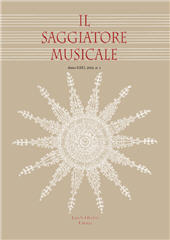Per un'ermeneutica dei due 'Lauri'
P. 35-68
The essay, along with its appendix, revisits the current interpretation of the Lauro secco and Lauro verde, drawing on the work of Newcomb (1975) and Durante-Martellotti (2010). According to their interpretation, the Lauro collections are connected to Laura Peperara's move to Ferrara, where she joined the Concerto delle Dame and was preparing for marriage. The anthologies – particularly the second – could thus be seen as a form of epithalamium. This interpretation is supported by the dedication sonnet of the Lauro verde, likely written by Tasso and addressed to a woman named Laura. However, it is noteworthy that several elements in the Lauro anthologies do not quite seem to fit this interpretation. E.g. Madrigal no. 6 from the Lauro secco refers to the account of Love's birth found in Plato's Symposium, where Love is conceived after Penia «steals» the seed of the unconscious Poros.
Then, some poems from the Lauro verde, such as no. 20, describe emotional and sexual behaviors that seem inappropriate for a young bride. Madrigal no. 29 from the Lauro verde even subverts the meaning of the Eucharist, presenting a lyrical “I” who yearns to become food for the god Love. Additionally, the opening motto of the Lauro secco surprisingly references the Sacris solemnis, a hymn by St. Thomas Aquinas for the Feast of Corpus Domini. This essay proposes a new interpretation of the Lauro anthologies, which seeks to explain their unusual content and symbolic framework – which draw on specific classical sources listed in the appendix. This new reading ties the collections to Renaissance Neoplatonism and suggests that Torquato Tasso, possibly the editor of the collections, was influenced by these ideas. It also invites reconsideration of Laura Peperara's role as the potential recipient of both collections. Publisher's text]
116677 characters
-
Artículos del mismo número (disponibles individualmente)
-
Información
Código DOI: 10.82026/11130
ISSN: 2035-6706


